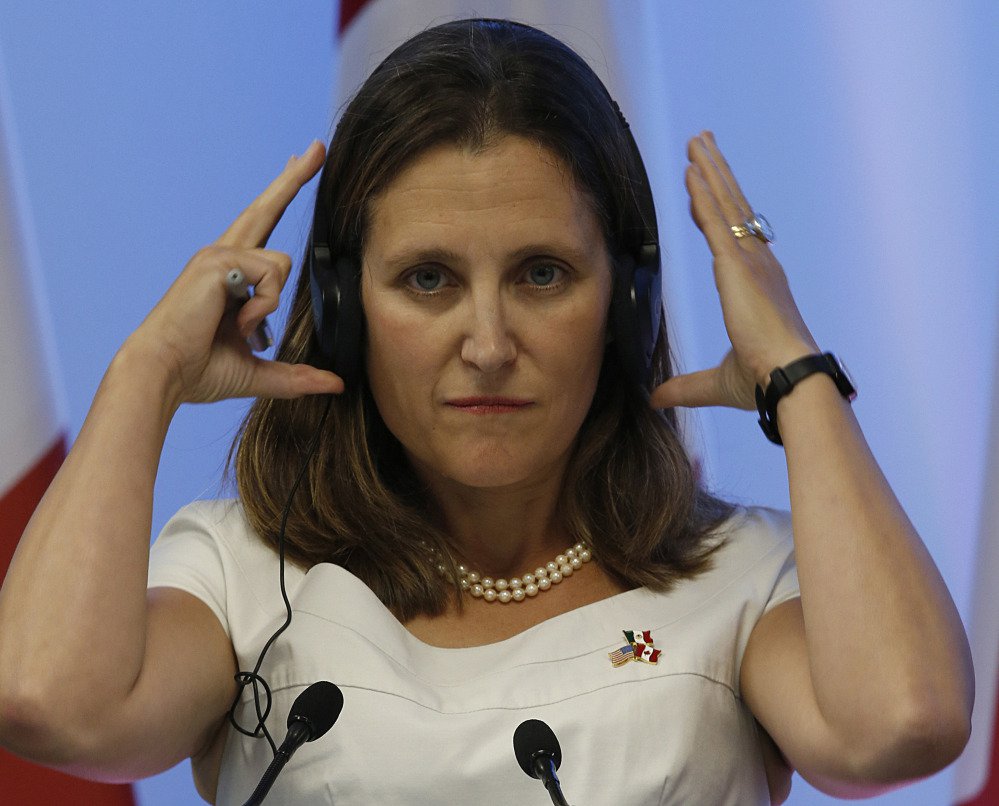In the second round of NAFTA negotiations last week in Mexico City, few Canadians had a higher profile than Jerry Dias.
He spoke to a labor rally and a conference. He met at length with Canada’s chief negotiator, Steve Verheul, over red wine and bar nuts. He held court with reporters regularly.
Yet Dias is no government minister or aide. He’s the head of Unifor, Canada’s largest private-sector union, and hates the North American Free Trade Agreement. And he’s at the forefront of Prime Minister Justin Trudeau’s renegotiation strategy – a reminder that, like President Trump, Trudeau has his own economic interests and domestic politics to cater to. That means giving labor a prominent seat after Trump spurred new NAFTA talks.
Trudeau, the country’s most left-leaning prime minister since his father, has repeatedly said the new NAFTA must be more progressive. Among its core objectives, Canada has proposed including environmental provisions and those related to gender and the rights of indigenous peoples.
But it’s labor that’s been at the forefront. Enter Dias.
Speaking in Mexico City, the combative union leader declared NAFTA a failure for workers in all countries, insisted that Canada would press for higher labor standards in both the U.S. and Mexico. He called Trump “crazy” while sounding a lot like the U.S. president in decrying job losses.
Trudeau is indeed pressing for stronger labor rights, a stance that will add another hurdle to reaching a timely agreement as Dias essentially sets the tone on the government’s behalf.
“They know I’m here today, they know exactly what I’m going to say today,” Dias told reporters after speaking to a rally of Mexican workers, demanding higher wages for them. He insists that Canada will walk away from the negotiating table without major labor changes. “It’s a red line,” Dias said.
With U.S. and Mexican elections looming, the three countries are accelerating talks in hopes of reaching consensus before the end of the year. Labor’s prominent role underscores that Canada has its own political considerations too. Trudeau won power by shifting his centrist Liberal Party to the left and has since wooed labor.
“Comparatively to the last government, it’s night and day,” said Hassan Yussuff, head of the Canadian Labour Congress and an appointee to Foreign Minister Chrystia Freeland’s NAFTA advisory panel. Others tapped for the panel include former Conservative lawmakers, whose party was at odds with the labor movement while in government, and a senior figure from the New Democratic Party, typically the most closely aligned with labor.
Adam Taylor, a principal at trade consultancy Export Action Global and former official in the last government, said domestic politics is driving the labor courtship. “It is partly for votes,” he said. “Their coalition of voters probably will accept free trade, but want it to be grounded in all the progressive issues the Liberals are bringing to table.”
Among Canada’s proposed NAFTA changes is an overhaul to U.S. and Mexican labor law, according to an official familiar with the talks, including so-called U.S. “right-to-work” rules, derided by labor leaders, that ban unions from requiring workers to pay dues. The U.S., while sure to balk at that, is with Canada in pressing for higher wages – although Mexican Economy Minister Ildefonso Guajardo said there’s no consensus on how to do that.
“On this you’ll have two groups of ideas that could contrast,” he told reporters as the second round of talks concluded Sept. 5. Those include “institutional improvements in labor rights” and a process of forcing through higher salaries, he said. Guajardo opposes the latter measure.
After Trump’s election, Trudeau shuffled his Cabinet to prepare for talks – making Freeland his foreign minister and leaving NAFTA in her hands. Shortly afterward, the Trudeau government invited Yussuff for a meeting. He spoke with Trudeau’s two top aides, Gerald Butts and Katie Telford, and the prime minister himself. Yussuff said they wanted to know whether his labor group would work with them. It’s clear labor was part of Trudeau’s plan.
“He got elected, by the way, because he had the right messaging both to workers and to a large extent to Canadians – and he realized, ‘Hey, I might as well stay there, I got elected on it,’ ” Yussuff said. “It also sends a good message to other people on the business side – maybe they’re being too selfish and arrogant.”
Cameron Ahmad, a spokesman for Trudeau, said his senior aides have met regularly with Yussuff and other labor leaders. A strong and respectful working relationship with Canada’s labor movement “is critical for our government,” Ahmad said.
The pledges that Trudeau is making to Canadian labor will make it tougher for him to compromise at the NAFTA table. Yussuff said the government will need to press Mexico in particular to honor pledges for labor reform, while Dias insists all three countries need to honor eight core conventions, including the right to organize, laid out by the International Labour Organization to make NAFTA work. Dias wants raises big enough that Mexican auto workers can all afford to buy the cars they make.
“At the end of the day,” Yussuff said, “they have to convince Mexico and the U.S. to equally agree to these changes.”
Send questions/comments to the editors.



Success. Please wait for the page to reload. If the page does not reload within 5 seconds, please refresh the page.
Enter your email and password to access comments.
Hi, to comment on stories you must . This profile is in addition to your subscription and website login.
Already have a commenting profile? .
Invalid username/password.
Please check your email to confirm and complete your registration.
Only subscribers are eligible to post comments. Please subscribe or login first for digital access. Here’s why.
Use the form below to reset your password. When you've submitted your account email, we will send an email with a reset code.